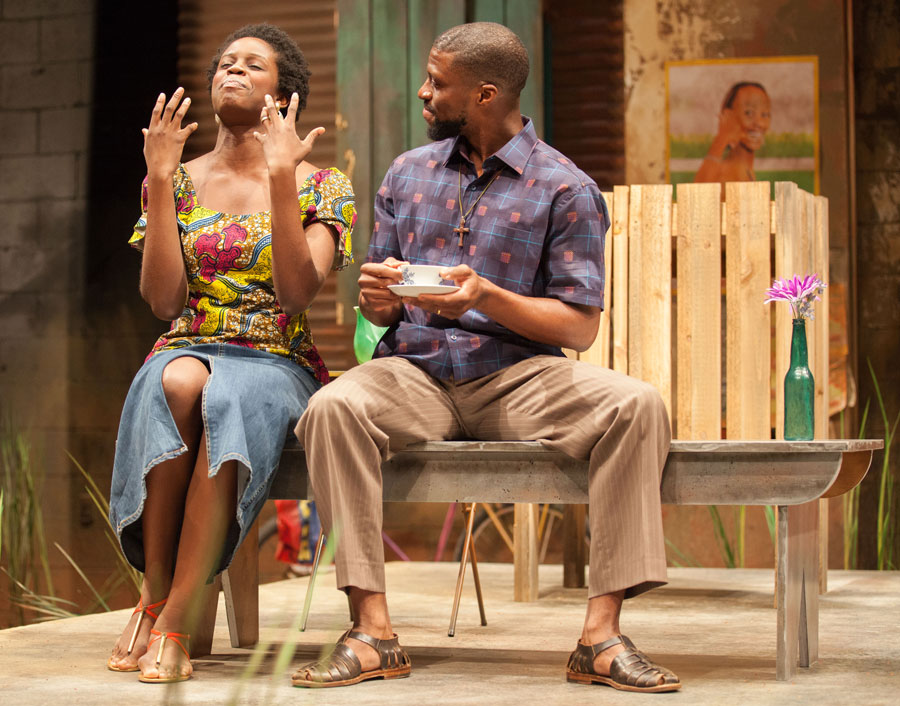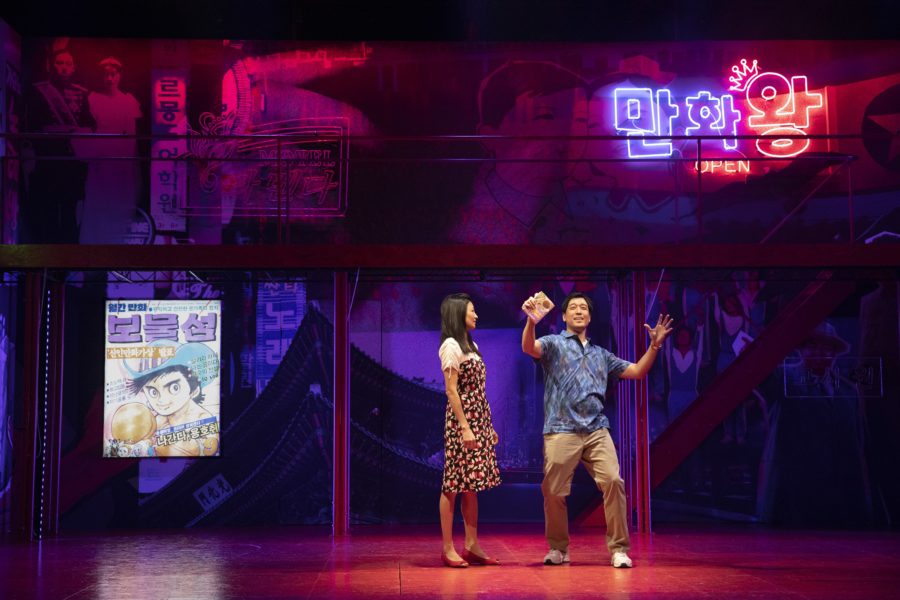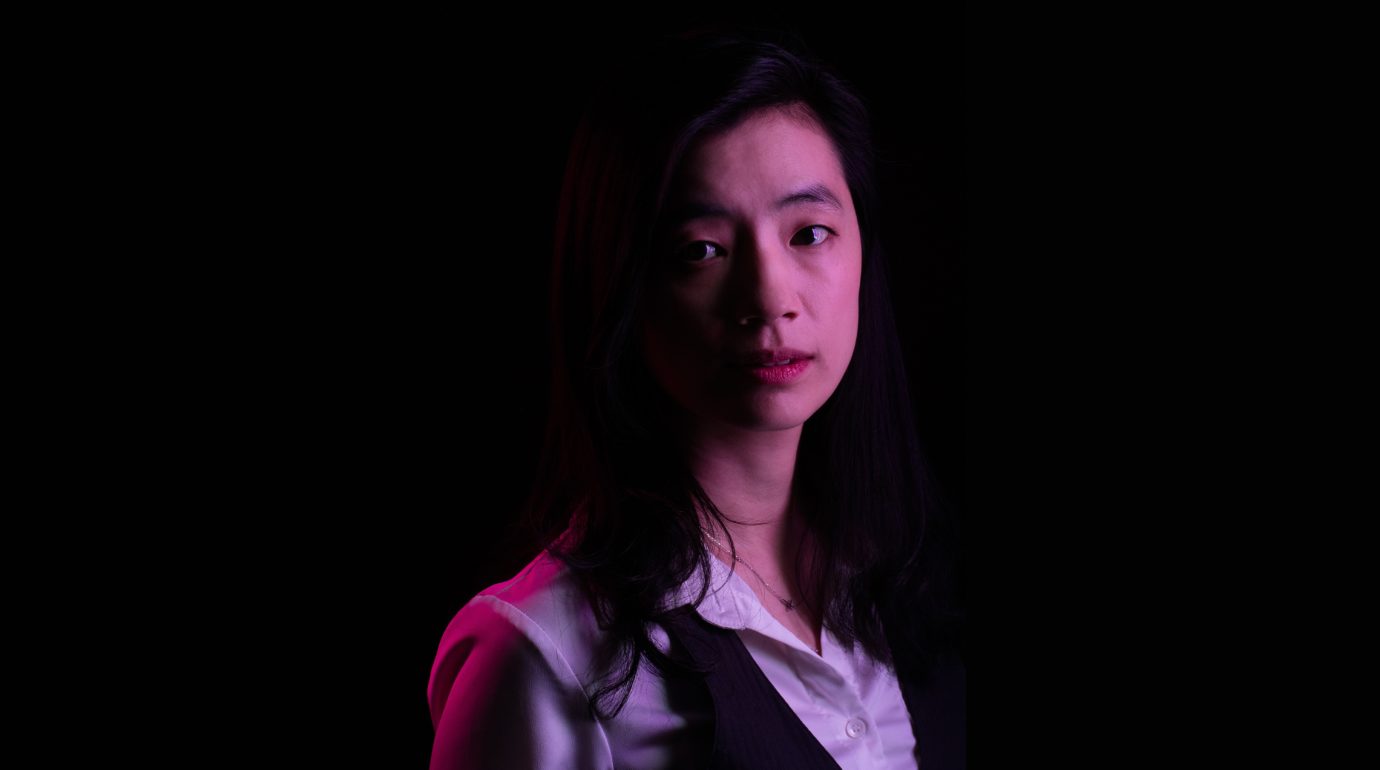Interviews make Hansol Jung uncomfortable, she admits, looking at the recorder that’s on the table. I ask her why. “’Cause it will exist in perpetuity,” she explains. “It’s not ephemeral. It will be there, and it will define and make up who you are aside from the life you’re living.” Like a social media profile, it’s another constructed identity that will color how other people look at you.
Jung knows something about that; she’s been managing multiple identities her entire life. The playwright, whose newest work, Wild Goose Dreams, is currently at the Public Theater in New York City, was born in Jeonju, South Korea. When she was six her family moved to South Africa, because her father had been accepted at the University of Stellenbosch. Living under apartheid in the late 1980s, her family, she notes flatly, was considered “honorary white.”
When she was 13 the family moved back to South Korea, where people assumed she was, as she put it euphemistically, “special,” because she didn’t speak the way other Koreans spoke. Ten years later Jung moved to the U.S., and this past August celebrated her 10th year here.
So you can see why for her, life feels like an endless game of code-switching; you can even hear it in her accent, which sounds slightly Korean, slightly British, and is also filled with Americanisms: “oodles,” “dude!”
“I feel like I have multiple existences,” she explains over Thai food in the East Village, on break from rehearsals for Wild Goose Dreams. “Being in Korea, being here, and being in South Africa—those are all different people and they all still live inside me. I feel like I’m always negotiating different realities and different who I am.”
Because of Jung’s global background, and her feeling a bit like a stranger anywhere she goes, that sense of being unmoored affects the characters she writes about. Wild Goose Dreams , which had its world premiere last year at La Jolla Playhouse, follows a North Korean defector living in South Korea who is haunted by the father she left behind. A year earlier, at the Humana Festival of New American Plays, Cardboard Piano was set in Uganda, where a young lesbian couple encounter a former child soldier. Her other works—No More Sad Things, Among the Dead, Wolf Play—also contain characters who are lost and traumatized, who spend their respective plays trying to find some sense of direction.
Jung herself is aware that she tends to gravitate toward the troubled. She notes with bemusement that good storytelling usually requires conflict. “Happiness does not sell,” she says with a small smile.
But she has questioned this tendency in her work before, as she’s nothing if not self-aware. “I had a moment a couple of years back where I was like, ugh, it’s kind of gross—why do I keep wanting to write about other people’s sad stuff?”
It goes back, she explains, to feeling like a perpetual foreigner. “I just felt so uprooted, and I think that’s all I could write about, feeling ungrounded, and I needed to know how to deal with it,” she explains. She places those same anxieties onto her characters. “I think it comforted me, to complete such a person’s journey. It never really resolves, but I think I always end up landing at a place where they have a direction in which to go, with a certain hopefulness and understanding at least of their current position. And that understanding in itself gave me comfort.”
This is what attracts director Leigh Silverman to Jung’s work. Silverman directed the world premiere of Cardboard Piano and Wild Goose Dreams at La Jolla Playhouse, and she’s working on it again at the Public.
“Even though it’s a very specific point of view—it’s a very specific world and a very specific place—it’s very universal,” Silverman says. Wild Goose Dreams is “simultaneously an incredibly specific story about a North Korean defector and a South Korean man, but at the same time it’s about all of our needs for connection and family, and overcoming the obstacle of loneliness and feelings of isolation in our world right now.”
In today’s uncertain times, Jung’s brand of lost and found is appealing to producers around the country. Cardboard Piano is playing this season at New Repertory Theatre in Massachusetts, Timeline Theatre Company in Chicago, New Conservatory Theatre Center in San Francisco, and Diversionary Theatre in San Diego, Calif. Wolf Play, about a Korean boy adopted by a lesbian couple, will play at Artists Repertory Theatre in Portland, Ore. And earlier this year, Jung started writing on her first television show, “Tales of the City” on Netflix (alongside fellow playwrights Marcus Gardley and Jen Silverman). For a dislocated artist, she’s finding lots of places to be.

When Jung was 20 years old, she studied abroad in New York City. It was there that she encountered her theatrical gateway drug. She was studying English literature at the time, because she wanted to be “a foreign ambassador in the Middle East.” Seeing my confused face, she remarks with a laugh, “I was a very weird kid! I went into English Lit because I thought that for my undergrad, I needed to learn about how humans work and I’m going to learn that through literature.” It made sense to her at the time.
Then she happened to see Alan Cumming and Natasha Richardson in Cabaret on Broadway. “I was completely confused,” she recalls, but she “couldn’t stop thinking about it.” Almost every weekend during that year abroad, she would stand in line at the TKTS discount booth for tickets to shows. She remembers sobbing during Rent, which she saw four times.
Jung took a left turn and decided to be a musical theatre director. She served as assistant director and interpreter for a production of Jekyll and Hyde in Seoul, and translated more than 30 English-language musicals into Korean. She then applied to the master’s program in musical theatre directing at Pennsylvania State University.
She admits now that school wasn’t a great fit. “The professors were, I guess, expecting me to be American and understand American musical theatre in a more traditional way, and I did not,” she says. That rigidity rankled her, so she turned to playwriting, where she could be more authentically herself. “It felt really great to be able to say, ‘This is what I see of the world and you, white boy, have to say what I think of the world.’ It was very satisfying to make people do that and to see them find a point of connections within my work into their hearts. It just felt like I was being seen for me, not a version that was acceptable to give.” (Later at Yale, she wrote a yet-to-be-produced play about Penn State’s former football coach and serial child rapist, Jerry Sandusky.)
It was while taking a class about modern American plays that Jung was assigned works that would form a kind of holy trinity for her: Dael Orlandersmith’s Yellowman, Paula Vogel’s How I Learned to Drive, and Lynn Nottage’s Ruined. She read all three in one week and remembers being blown away.
“It was so eye-opening, the structural whimsy, the craft of Paula’s organizing principle in How I Learned to Drive,” she recalls enthusiastically. “And with Yellowman, how you can dip in and out of different realities in one body, that’s so exciting. And then the ease of how you move in and out of incredible pain, and then go immediately to laughter in Ruined. It was like, whew!”
Jung admits that the things she’s written so far have been inspired in form and style by those plays. In Among the Dead, the main character Ana travels back to Korea to learn more about her parents, a Korean comfort woman and an American soldier. The narrative jumps back and forth in time and features a smart-talking Jesus Christ. Among the Dead got Jung into the playwriting program at Yale School of Drama, and was produced Off Broadway at Ma-Yi Theater Company in 2016 (a fan of collaboration, Jung heavily rewrote the script in rehearsals).
To Ma-Yi artistic director Ralph Peña, who directed Among the Dead, the appeal of Jung’s writing is its unpredictability. “It’s not how most people would enter this story and that’s what makes it interesting,” Peña says. After all, what other playwright would write a mother-daughter tale where the daughter eventually steps into her mother’s shoes and relives the events of her mother’s life? In two harrowing sequences, Ana even has sex with the ghost of her father and gives birth. “It’s pretty messed up,” agrees Peña, but he says the play is ultimately about “a daughter and a mother reconciling over time.”

How Jung gets there: pure theatricality. In Wild Goose Dreams, the North Korean defector, Nanhee, makes a connection to a South Korean man while being haunted by the ghost of her father—and a penguin.
Like Cardboard Piano, the name Wild Goose Dreams is a metaphor. The Korean term “gireogi appa” means “goose father,” which the play defines as “a Korean man who works in Korea while his wife and children stay in an English-speaking country for the sake of the children’s education.” Most playwrights would have taken that metaphor and run with it, but Jung is not most playwrights. Not satisfied with just one metaphor, she has the penguin in Wild Goose Dreams represent Nanhee’s father, who, like a penguin, cannot fly away to see his child. Oh, and there’s also a Greek-style chorus on hand to intone, “Disconnected. No new emails. No new text messages. No new Facebook notifications.” It’s an image that represents both the barrage of tech stimuli and the heightened loneliness of contemporary life.
Remarks director Silverman, “Hansol has no shortage of metaphors, and they’re incredibly integral, holistic, and beautiful.”
Adds Peña, “She’s not limited by the old conventions. She’ll think outside them. She’s going to places we’ve never been; that’s very good for theatre. She’s not a linear writer. It allows a lot of exciting experimentation with form and narrative. It’s very, very theatrical.”
In ordinary conversation Jung turns naturally to metaphor. When talking about where she is now as a playwright, for instance, she invokes surfing. “It feels like this is the crest of a wave. I’m at the top of it, of that first surge of wanting to be a playwright and having accomplished my dumb goals that I set as a grad student,” she explains. “I think I’m about to start a new wave, to continue the surfing metaphor.” She adds wryly, “I’ve never surfed before.”
When Jung graduated from Yale in 2014, she gave herself a five-year deadline to make it in American theatre, after which she would decide whether to stay here or go back to Korea.
Next year marks five years. So what is she going to do? Jung won’t answer definitively, except to say that since her green card application was approved in July, “I’m definitely moving in the direction of staying.” Of course, that also depends on the state of American politics; it’s “driving me crazy,” she admits, that she can’t vote.
So as is her custom, she’s channeling her anxieties into her art. As someone who’s learned to be comfortable living in the in-between, that means it’s time for new concerns and questions to replace the old ones. She’s currently working on a commission for the National Theatre in London, a musical called The Circle, with British composing team Tim Phillips and Marc Teitler, about privacy in the age of the Internet and social media. Until now, she muses, her “understanding has been very focused on the individual. I think now I want to move out into groups of people, not just the individual. I want to understand that dynamic. I want to understand power dynamics. The buzzword would be sexism, racism—but like, what are the other congealing factors that make up those words?”
Having lived in places affected by racism, Jung has been thinking about social structures, and why humans seem to have a need for hierarchy. One of the last stories Jung tells me before we part is her theory about the Bible.
“When Adam and Eve ate the apple, the knowledge that was given that destroyed humans was the knowledge that there is power,” she explains. “And so vulnerability became a bad thing. That would be, I think, the thing that broke everything—the understanding that someone is higher and someone is lower.”
It’s an arresting concept, and disturbing as well. In other words: It’s positively Jungian.
*A previous version of this story stated that Hansol Jung returned to Korea when she was 15. She was actually 13. Jung also wrote her play about Sandusky while she was at Yale, not at Penn State.


